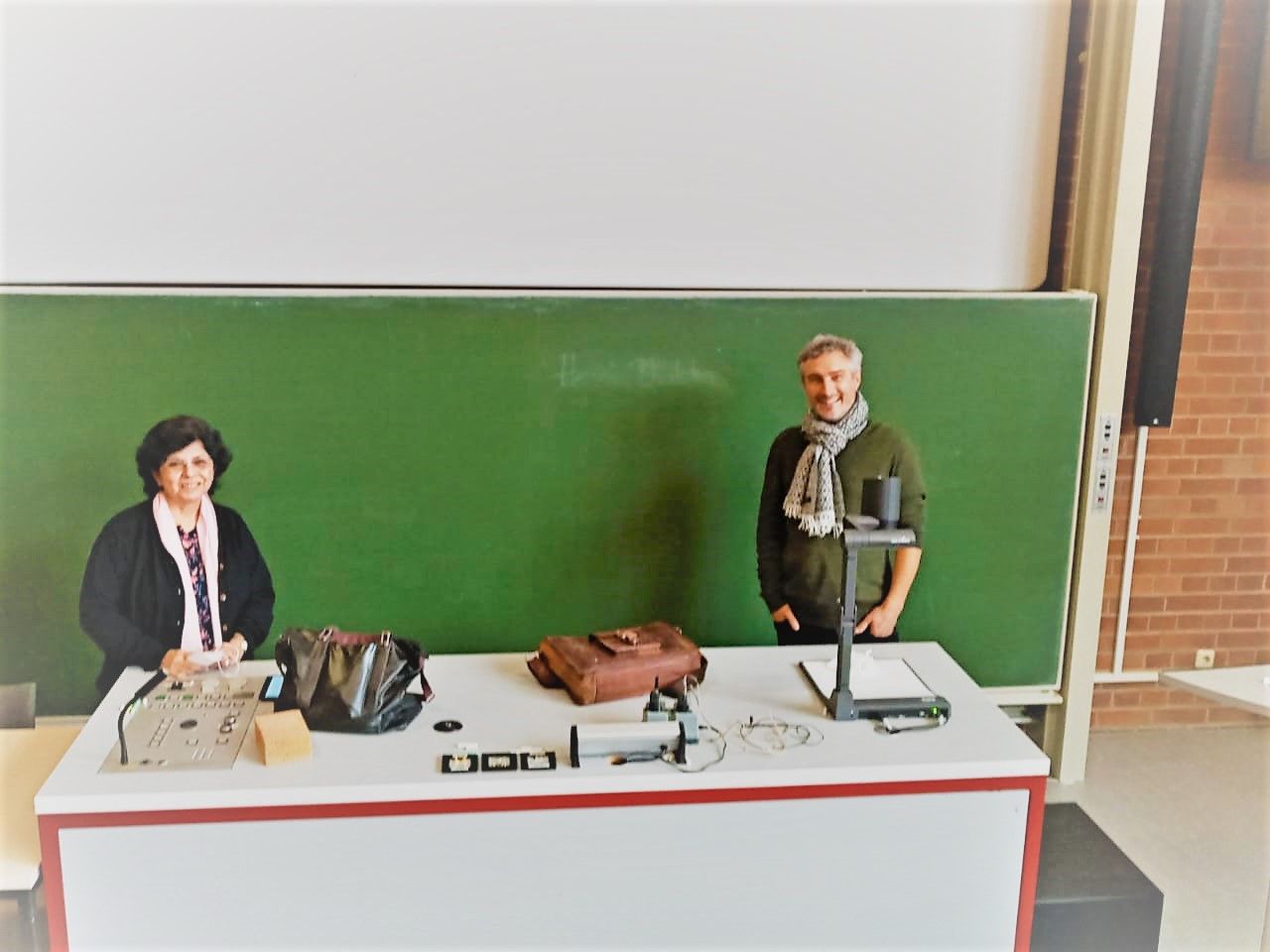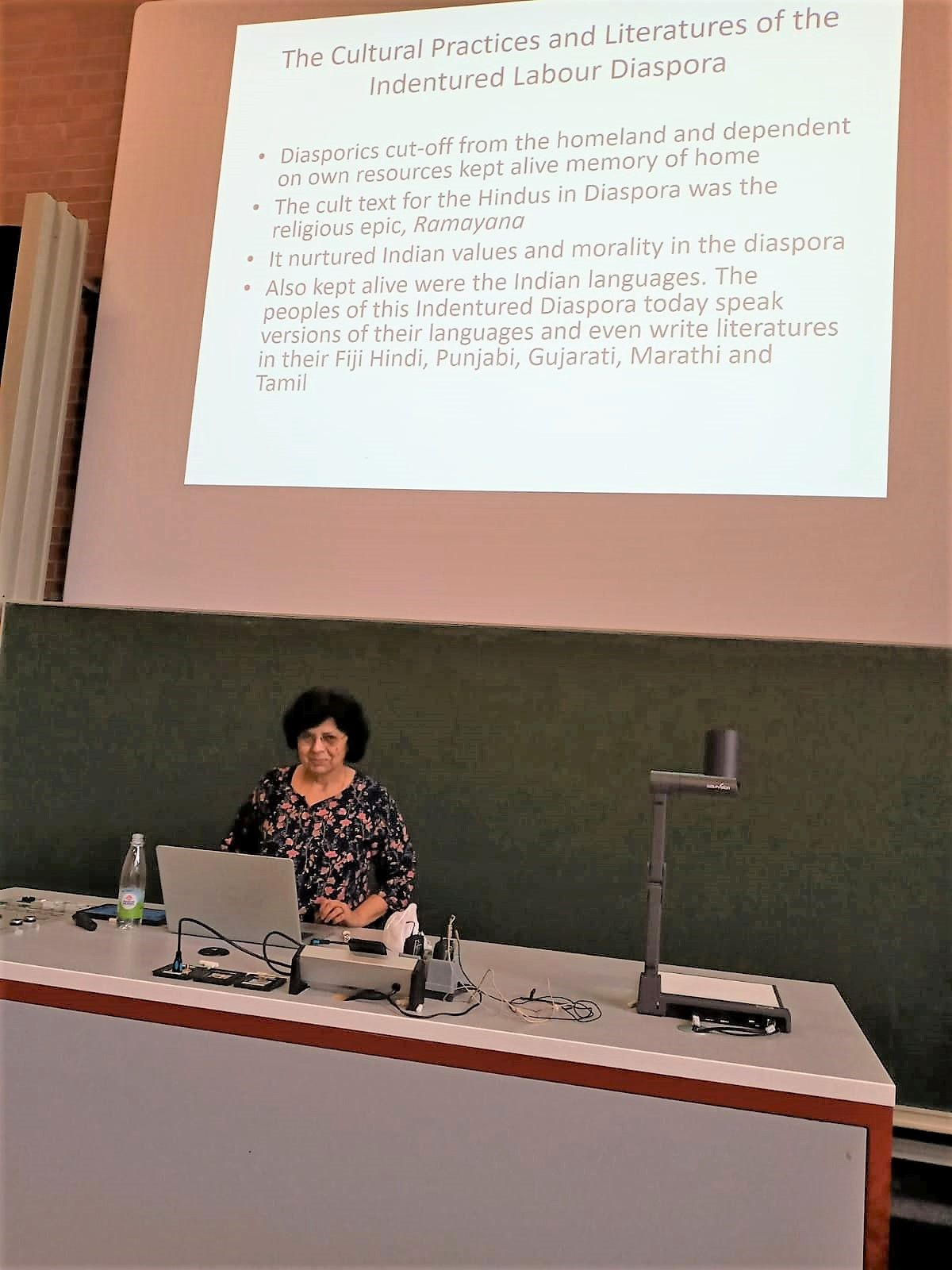Meet the Grantee: Nilufer Bharucha
Diasporic Literature and Culture
The Executive Board selected Professor Nilufer Bharucha in the very first call of the Bayreuth Humboldt Centre in 2019. However, due to the global pandemic, it was until November 2021 that she could finally make it from India to Bayreuth. At the University of Mumbai, Professor Bharucha directs the „Mumbai Muenster Institute of Advanced Studies“. In Bayreuth, she was happy to explore the potential for coordinated graduate research on diasporic literature and culture together with her host, Professor Florian Klaeger (Chair of English Literature).

Grantee Nilufer Bharucha and her host Prof Klaeger
What are the foci of your joint research funded by the Short Term Grant?
Nilufer Bharucha: Our joint research interests focus on diasporic writing, in particular that of the vast Indian diaspora. The purpose of the visit was, first, to enter into an interdisciplinary dialogue with colleagues from Bayreuth and elsewhere on 'symbols of the future and the future of symbolism'. This topic links the study of futures and futurity with the question of methodology across disciplines, inquiring into the nature and the purpose of symbolic signification in fields as varied as ecology, philosophy, and literature. In pragmatic terms, the aim of the visit was to explore the possibility of establishing, at the University of Bayreuth, a joint research infrastructure for the study of diasporic literature.
In what way is your work interdisciplinary, and what does interdisciplinarity mean to you in academic work and life?
As a literary scholar, my work is interdisciplinary by nature. Literature, and diasporic literature in particular, is a medium facilitating a connection between what is - 'reality', contingent circumstance - and what can be imagined. In this sense, my work always relies on other disciplines also studying the material and social circumstances addressed in literature: sociology, ethnology, history, ecology, religious studies, etc. Within the literary studies, too, diasporic literature cuts across the borders of conventional national philologies. The Indian diaspora is spread across the entire world, and its literatures come in many languages and forms. That said, "inter-"disciplinary work also implies that disciplinary boundaries are taken seriously and reflected on. I do believe that the contribution of literary scholarship to the study of diaspora is in dialogue with, but also different from, the study of diaspora in other disciplines. To take interdisciplinarity seriously is to remind ourselves of the specificity of our own work as scholars of literary meaning-making.

What is in your opinion the future of your field / in what way can research in your field contribute to meeting the urgent challenges of our time?
Diasporicity is often seen as a concept comprehending various sorts of displacement, and it is almost ubiquitous in today's world (and has been for a long time). The study of diasporic culture is crucial to understand our increasingly globalized and networked world. I think that the study of diasporic literature in particular can make a significant contribution to the development of open-minded and empathetic students.
What does international research mobility mean to you?
My visit to Bayreuth was delayed by one and a half years owing to the pandemic. I was very glad to finally come here, and to make use of what has turned out to be a small window of opportunity for such mobility. I think our work thrives on personal encounters and nuanced dialogue, which cannot be replaced by Zoom meetings forever. During my visit to Bayreuth, we laid the foundations for an MoU between UBT and the University of Mumbai, which will hopefully enable colleagues and students to reap the benefits of international mobility.
How did the current challenges influence your cooperation?
The delays owing to the pandemic were regrettable. I was to present a keynote lecture at a conference planned for March 2020 at UBT, which had to be cancelled. However, the proceedings from this conference were published in a volume on 'symbols of the future and the future of symbolism', which in itself might be symbolic of how we can move beyond the challenges and turn our experience of the past two years into something of value. As during previous visits, I enjoyed meeting Bayreuth students, who remained keenly interested in the topic of diasporic literature. I am happy for the opportunity to make face-to-face conversations happen.
The Grantee:
Professor Nilufer E. Bharucha is Director of the Mumbai Muenster Institute of Advanced Studies (MMIAS), formerly the CoHaB Indian Diaspora Centre, at the University of Mumbai. She is former Head and Senior Professor, Department of English, University of Mumbai. She has received several professional awards such as the British Council Scholarship , the Commonwealth Academic Staff Fellowship for post-doctoral research, the DAAD (German Academic Exchange Service) Visiting Professorships at German universities, the Indo-Canadian Shastri Institute's Visiting Lectureship at Canadian universities and the ICCR (Indian Council for Cultural Relations) Rotating Chair at the WW University of Muenster, Germany. She has been on the juries of the Commonwealth Literature award, the Sahitya Akademi, Delhi's award in English Literature and on the Selection Committee for the Rhodes scholarship. She has published widely in India and abroad on the literature and cinema of the Indian Diaspora, Law and Diaspora Literature and the Writing of the Parsees. She is also a creative writer in English and a translator of Gujarati poetry and fiction into English.
